Russia-Ukraine latest updates: Moscow using Soviet-era missiles
Ukraine news from June 30: The number of Russian missile attacks on Ukraine has more than doubled in the last two weeks, and Moscow is using inaccurate Soviet-era missiles for more than half of the attacks.
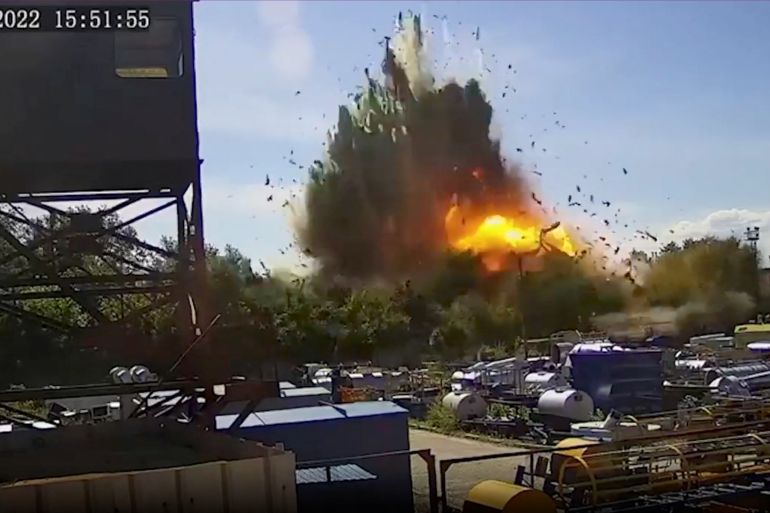
- President Joe Biden says the United States will support Ukraine for “as long as it takes” to ensure it is not defeated by Russia.
- Russia’s defence ministry announces its troops have withdrawn from Snake Island in the Black Sea as a “gesture of goodwill” aimed at demonstrating Moscow’s support for efforts to restart food exports from Ukraine’s ports. Ukrainian officials hail the announcement as a victory for their forces.
- NATO Secretary-General Jens Stoltenberg says Sweden and Finland will next week sign their accession protocols to formally join the alliance as its leaders wrap up a summit in Madrid.
- The UN’s humanitarian coordinator in Ukraine warns nearly 16 million people in the country are now in need of humanitarian assistance, including access to food, water and health services.
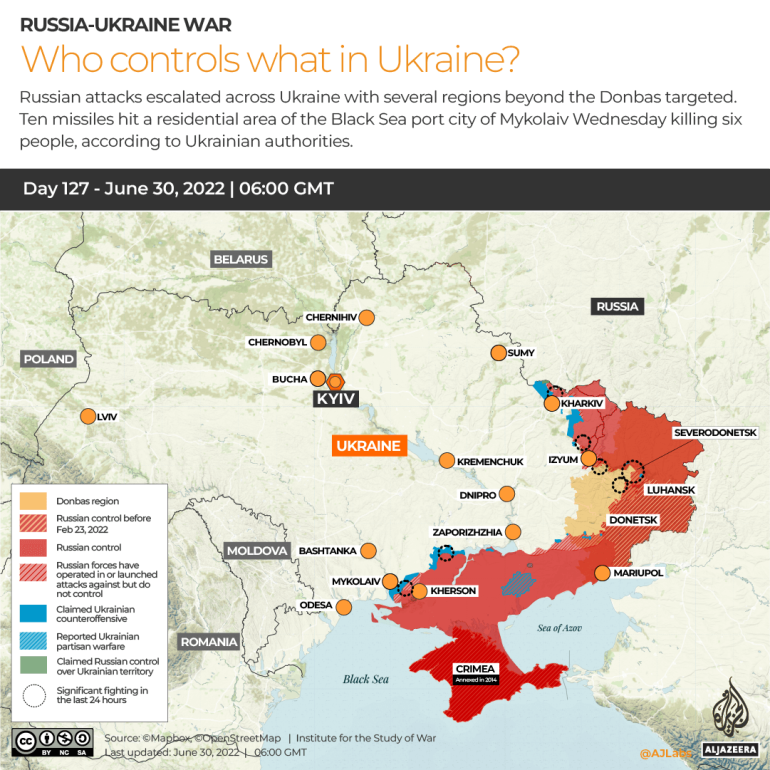
The live blog is now closed, thank you for joining us.
These were the updates on Thursday, June 30:
Keep reading
list of 4 itemsRussian forces pull out of strategically important Snake Island
An unexpected friendship: The gravediggers of Bucha
The struggle for Snake Island
France to deliver CAESAR howitzers to Ukraine
President Macron has announced that France will deliver six CAESAR howitzers and armoured vehicles to Ukraine, the Kyiv Independent reports.
Macron added that the NATO allies’ meeting in Madrid “unanimously decided” to boost humanitarian and military aid to Ukraine.
France will deliver "6 more Caesar howitzers and a significant number of armored vehicles" to Ukraine, Macron said.
— The Kyiv Independent (@KyivIndependent) June 30, 2022
US blocks company linked to Russian oligarch
The United States on Thursday blocked a US-based company worth more than $1bn linked to Russian oligarch Suleiman Kerimov, saying the Putin ally used it to funnel and invest shadowy funds.
The Department of the Treasury said that Kerimov, a billionaire active in Russian politics, secretly managed the Delaware-based Heritage Trust, which put its money into a number of large public companies, AFP reported.
Heritage Trust, set up in 2017, brought money into the United States through shell companies and under-the-radar foundations established in Europe, Department of the Treasury officials said.
The Bloomberg Billionaires Index, in newly updated figures, ranked Kerimov as the world’s 127th richest person with a worth of $13.3bn.
Russia strikes Ukraine with less precise Soviet-era missiles
Russia is using inaccurate missiles from old Soviet stocks for more than 50 percent of its attacks in Ukraine and the rate of the attacks has more than doubled in the last two weeks, a brigadier general in Ukraine’s armed forces said on Thursday.
Russian missiles have hit an array of targets in Ukraine in recent days, killing one civilian at an apartment block in Kyiv on Saturday and at least 18 more at a shopping centre in the central city of Kremenchuk on Monday.
Brigadier General Oleksii Hromov told a news conference on Thursday that Russia was trying to hit military and critical infrastructure, but that the use of old Soviet missiles that are less accurate was leading to significant loss of civilian life.
His analysis diverged from that of some Ukrainian politicians who accuse Russia of deliberately striking civilians to sow panic.
“The enemy’s targets remain military facilities, critical infrastructure and industry, transport networks. At the same time, the civilian population is suffering significant losses due to [poorly targeted] strikes,” Hromov said.
Russia summons ambassador over ‘offensive’ UK remarks
Russia’s foreign ministry said it has summoned the British ambassador in Moscow, Deborah Bronnert, to protest against Boris Johnson’s “offensive” comments regarding Russia and Vladimir Putin.
A strong protest was expressed to the ambassador over “the frankly boorish statements of the British leadership regarding Russia, its leader and official representatives of the authorities, as well as the Russian people”, it said in a statement.
The ministry said Russia had told her it objected to British statements containing “deliberately false information, in particular about alleged Russian ‘threats to use nuclear weapons'”.
Russia’s move comes after Johnson said Putin would not have started the war in Ukraine if he were a woman and said the military operation was “a perfect example of toxic masculinity”.
Ukraine begins exporting electricity to the EU
Ukraine has begun exporting electricity to the European Union, Ukrainian Prime Minister Denys Shmyhal and the EU Commission President Ursula Von der Leyen announced on Thursday.
“Just three months after receiving the energy certification, the long-awaited export of Ukrainian electricity to Europe has begun! Today, from the first hour of the night, such exports went to Romania. The initial volume is 100 MW,” Shmyhal said in a Facebook post.
The president of the European Commission welcomed the move, saying it serves both Ukraine’s and the EU’s needs.
“It will provide an additional source of electricity for the EU. And much-needed revenues to Ukraine,” von der Leyen tweeted on Thursday. “So we both benefit.”
🇪🇺🇺🇦 Very glad to announce that as of today, Ukraine can export electricity to the EU market.
It will provide an additional source of electricity for the EU.
And much-needed revenues to Ukraine.
So we both benefit. #StrongerTogether pic.twitter.com/1BG600uUJt
— Ursula von der Leyen (@vonderleyen) June 30, 2022
Erdogan treads a fine line on Ukraine war
Erdogan has called for intensified efforts to end the war in Ukraine.
There are “no losers in a just peace”, he said, speaking at the end of a media conference at the NATO summit in Madrid.
He added that Ankara was trying to pursue “a balanced policy” because of its heavy reliance on Russian energy imports.
Turkey has supplied Ukraine with armed drones and other weapons, but Erdogan also enjoys a close working relationship with Putin.
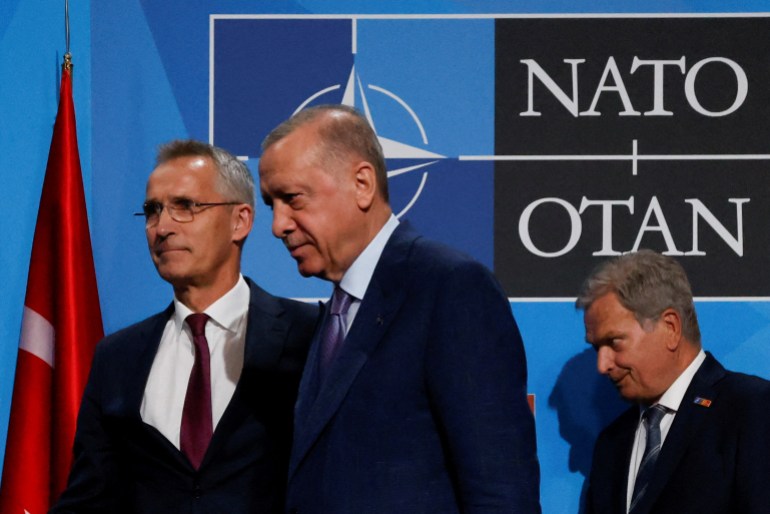
Ukraine cuts diplomatic ties with Syria
Ukraine’s foreign ministry has announced that it has cut diplomatic ties with Syria, a day after the Syrian presidency officially recognised the “independence” of the two breakaway regions of Luhansk and Donetsk in eastern Ukraine.
The ministry “strongly condemns the decision of the Syrian Arab Republic to recognise the so-called ‘independence’ of the temporarily occupied territories in Donetsk and Luhansk oblasts”, it said in a statement.
Syria’s recognition of the so-called independence of Russian-occupied territories in Donbas is an unfriendly act towards Ukraine, an attack on its sovereignty, and a gross violation of the UN Charter. Ukraine will cut diplomatic ties with Syria and introduce a trade embargo.
— Oleg Nikolenko (@OlegNikolenko_) June 30, 2022
Russian official says possible price caps on oil could push prices higher: Report
Russia’s Interfax news agency has quoted Deputy Prime Minister Alexander Novak as saying that attempts to limit the price of Russian oil could lead to “disbalance” in the market and push prices higher.
Novak’s remarks came after leaders from the Group of Seven (G7) bloc of nations agreed on Tuesday to explore “the feasibility of introducing temporary import price caps” on Russian fossil fuels, including oil, and tasked ministers to evaluate the proposal urgently.
Putin downplays Ukraine grain blockage, denies Russia to blame
Russian President Vladimir Putin has denied that Moscow is blocking Ukrainian grain exports and questioned the impact of missing Ukrainian agricultural goods on the world food market.
“We do not prevent the export of Ukrainian grain. The Ukrainian military has mined the approaches to their ports; no one prevents them from clearing those mines and we guarantee the safety of shipping grain out of there,” Putin said at a news conference in Moscow, speaking alongside visiting Indonesian President Joko Widodo.
Putin also repeated Russia’s assertion that Western sanctions are to blame for problems with the global food market and rising prices. But he downplayed Ukraine’s effect on the global market, saying there were only five million tonnes of wheat currently stuck in the country.
“This is a quantity which does not affect the world markets in any way,” he added, saying it represented only 0.5 percent of global production.
The United Nations estimated in early May that 22 million tonnes of grain were stuck in Ukraine. Ukrainian President Volodymyr Zelenskyy said in early June that the figure could rise to 75 million tonnes after September.
Russia, China and the Nordic duo: Key points from NATO summit
Leaders of the 30 countries that make up the NATO alliance have agreed to a sweeping strategic framework for the next decade that focuses on the “direct threat” posed by Russia and declares, for the first time, that China is a security challenge.
Click here to read more on the key developments during the alliance’s summit in Madrid.
Indonesian leader issues food supply warning on Moscow visit
President Joko Widodo has warned global food supply issues will not improve if Russian fertiliser and Ukrainian wheat are unavailable to global buyers.
Speaking during a news conference alongside Russia’s Putin, the Indonesian president also said he had urged G7 leaders to ensure sanctions on Russia do not affect food and fertiliser supplies.
Erdogan urges Finland, Sweden to fulfil NATO deal promises
Turkish President Recep Tayyip Erdogan has urged Sweden and Finland to honour a deal they signed with Ankara in order to win its support for their joining of NATO, saying the agreement needs to be fully implemented otherwise ratification of the pair’s membership bids will not be sent to the Turkish parliament.
“We have strongly emphasised the message that we expect genuine solidarity from our allies, not only in words but also in action,” Erdogan told reporters at the NATO summit, which previously saw the Nordic countries formally invited to join the US-led military bloc.
Erdogan cited a pledge by Stockholm to extradite 73 “terrorists” as part of the promises made to Ankara and described the signing of the trilateral accord as recognition of his government’s sensitivities around “terrorism” and a “diplomatic victory” for Turkey.
UN official warns 16 million people in Ukraine in need of aid
The UN’s humanitarian coordinator in Ukraine has warned that millions of people inside the country are now in need of humanitarian aid as Russia continues to press on with its offensive.
“Almost 16 million people in Ukraine today need humanitarian assistance: water food, health services,” Osnat Lubrani told a news conference.
She added it was “extremely difficult if not … impossible” for humanitarian groups to access areas that are no longer under Kyiv’s control.
Lubrani also said more than 5.3 million Ukrainians have fled abroad because of the conflict and warned the UN’s casualty figures of “almost 5,000 civilians killed and more than 5,000 injured” were “just a fraction of the frightening reality”.
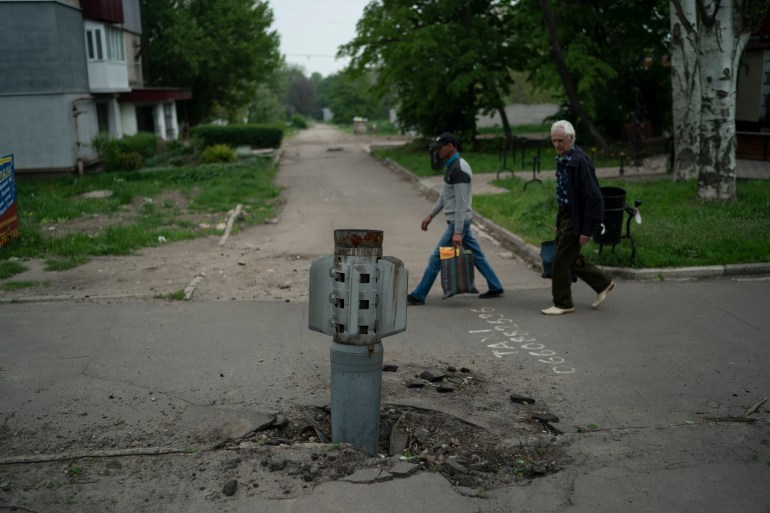
Lavrov says new ‘iron curtain’ descending between Russia and West
Russia’s foreign minister says a new “iron curtain” is descending between Russia and the West.
“It’s practically already coming into place. Let them just behave carefully,” Sergey Lavrov said of Western countries during a news conference.
The term “iron curtain” is used to describe the political boundaries that divided the European continent in the years following the end of World War II until the conclusion of the Cold War in 1991, as the Soviet Union and the United States faced off.
US to support Ukraine for ‘as long as it takes’: Biden
US President Biden says the US and its NATO allies will support Ukraine for “as long as it takes” as it faces down Moscow’s offensive.
“We are going to stick with Ukraine, and all of the [NATO] alliance are going to stick with Ukraine, as long as it takes to make sure they are not defeated by Russia,” Biden told reporters at the NATO summit.
“Ukraine has already dealt a severe blow to Russia,” he added, noting that he did not know how the conflict was going to end, but pledging “it will not end with a Russian defeat of Ukraine”.
Biden also said Washington will announce a new military aid package for Ukraine worth $800m in the coming days.
Russian equipment on Snake Island destroyed: Ukrainian military official
A Ukrainian military official says Russian equipment on Snake Island has been destroyed.
Oleksii Hromov, a brigadier general in Ukraine’s armed forces, told a news conference that as of yet there were no Ukrainian forces stationed on the Black Sea outpost, but claimed there would be forces deployed to the island soon.
He added that Ukraine’s military would do everything possible so ships carrying grain could pass through the Black Sea and said there were currently no plans to withdraw from the eastern city of Lysychansk, which Russian forces are trying to encircle.
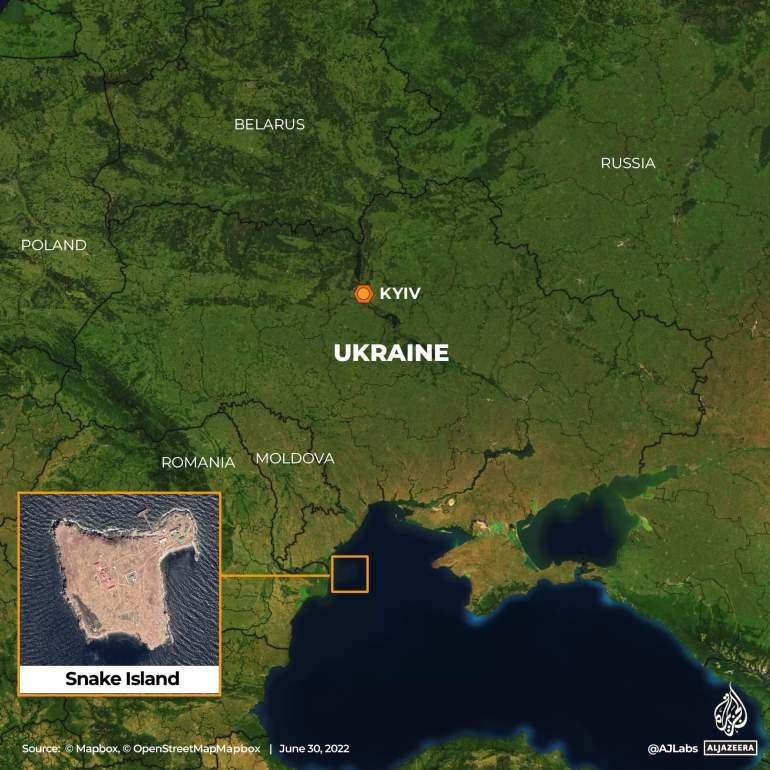
Scholz says Germany ramping up military capabilities as fast as it can
German Chancellor Olaf Scholz says Berlin is ramping up its military capabilities as fast as it can amid Russia’s offensive.
“For Germany, this means that we will continue to expand our contribution on land, at sea and in the air,” Scholz told reporters at the NATO summit.
Germany will permanently maintain a regional marine commando in the Baltic Sea, a tank division with 15,000 soldiers and 20 naval units, he added.
Scholz also said Germany will begin the NATO ratification process for Sweden and Finland this week.
UK’s Johnson says Snake Island withdrawal shows ‘impossibility’ of subduing Ukraine
British Prime Minister Boris Johnson says Russian forces’ withdrawal from Snake Island is firm evidence of Ukraine’s ability to “repel” Moscow’s invasion.
“If you wanted evidence of the amazing ability of the Ukrainians to fight back to overcome adversity and to repel the Russians then look at what has happened just today on Snake Island, where again Russia has had to cede ground,” Johnson told a news conference at the NATO Summit.
“In the end, it will prove impossible for Putin to hold down a country that will not accept his rule,” he added.
Johnson added that he believed Ukrainian troops “do indeed have it in their power to repel the Russians and to get them back to the pre-February 24th position”, citing the date on which Moscow launched its offensive.
Ukraine says Russia ramped up missile strikes in second half of June
Hromov, the Ukrainian military official, says Russia ramped up missile attacks on targets in the country in the second half of June.
He told a news conference that more than half of the missiles were from Soviet reserves and less precise, adding that was why Russia was hitting residential buildings.
Russia has denied targeting civilians since invading Ukraine in late February.
Kremlin to decide ‘at the necessary time’ whether Putin will attend G20 summit
The Kremlin says Putin has not yet decided whether to attend November’s G20 summit in Indonesia.
In a call with reporters, Kremlin spokesman Dmitry Peskov said Russia had an invitation to attend the event and would decide “at the necessary time” whether Putin will go in person.
NATO chief warns of ‘more dangerous world’: AJE correspondent
Al Jazeera’s James Bays, reporting from the NATO summit in Madrid, says the alliance’s Secretary-General Jens Stoltenberg painted a “very grim picture” of the global security situation during his address to reporters on the final day of the conference.
“He [Stoltenberg] compared it with the time of the Cold War … and said we live in a more dangerous and more unpredictable world,” Bays said.
“He then added it could get worse, with a possible full-fledged conflict between Russia and the NATO countries, but he said that is why the alliance has acted has it has to strengthen itself … to protect the allies,” he added.
“What we have seen in recent days is a bolstering of the forces that NATO has closest to Russia – there are six battlegroups in the countries that are closest to Russia.”
Sweden, Finland to sign NATO accession protocol next week: Stoltenberg
NATO’s secretary-general says Sweden and Finland will next week sign their accession protocols to formally join the alliance.
Jens Stoltenberg told reporters at the NATO summit that the move will take place on Tuesday, July 5.
The accession protocol must then be ratified by all 30 existing member states to allow both countries to become part of NATO and benefit from the alliance’s collective defence clause, which states that an attack on one member is considered an attack on all.
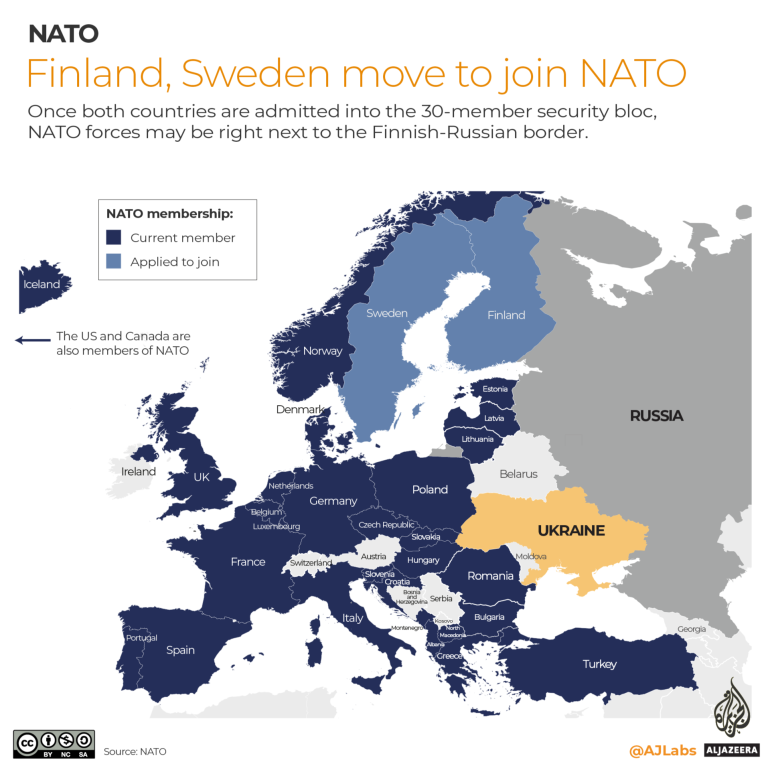
Captured Azov fighters will face trial, Putin ally says
Captured members of Ukraine’s armed forces who served in the Azov Regiment will face trial, the speaker of Russia’s lower house of parliament has said.
“These nationalists, who hands are covered in blood, are not humans. They are awaiting trial,” said Vyacheslav Volodin, an ally of President Vladimir Putin, in a Telegram post.
The Azov Regiment played a prominent role in the defence of Ukraine’s southeastern port city of Mariupol from Russian forces for months before being encircled and eventually laying down their arms.
Ukrainian officials hail ‘liberation’ of Snake Island
The head of Ukrainian President Volodymyr Zelenskyy’s office has hailed Russian forces’ withdrawal from Snake Island.
“KABOOM! No Russian troops on the Snake Island anymore. Our Armed Forces did a great job,” Andriy Yermak tweeted.
The Ukrainian army’s commander-in-chief also praised the “liberation” of the strategically important island.
“I thank the defenders of Odesa region who took maximum measures to liberate a strategically important part of our territory,” Valery Zaluzhny said in a Telegram post.
“Unable to withstand the fire of our artillery, missile and air strikes, the occupiers left Snake Island,” he added.
Russian official says sanctions could amount to ‘casus belli’
The deputy chairman of Russia’s Security Council has warned that sanctions against Moscow could be a justification for war.
“I would like to point out once again that under certain circumstances such hostile measures can also qualify as an act of international aggression. And even as a casus belli [justification for war],” Dmitry Medvedev, a former Russian president, said.
Medvedev was once seen as a liberal but has emerged as one of the most hawkish proponents of the war, delivering a series of scathing denunciations of the West, which has imposed sweeping sanctions on Moscow over its invasion.
Russia claims more than 6,000 Ukrainian soldiers have surrendered, been captured: Report
Russia’s RIA Novosti news agency has quoted the country’s defence ministry as saying that more than 6,000 Ukrainian servicemen have been captured or surrendered since the beginning of the war.
The ministry also said the exchange of 144 prisoners of war with Ukraine, announced on Wednesday by Ukrainian intelligence, was organised according to a direct order from Putin, RIA reported.
Kyiv made no immediate comment on the report. Al Jazeera could not independently verify the Russian defence ministry’s claims.
Pope implicitly accuses Russia of ‘imperialism’ over invasion
Pope Francis has implicitly accused Russia of “armed conquest, expansionism and imperialism” in Ukraine, calling the conflict a “cruel and senseless war of aggression”.
The head of the Catholic Church said during an address to a delegation of Orthodox leaders who had come to Rome for a religious celebration on Wednesday that the war was pitting Christians against one another.
Both Russia and Ukraine are predominantly Orthodox Christian but there is a sizeable Catholic minority in Ukraine.
The pope also told his Orthodox visitors, in a clear reference to Russia, that all needed “to recognise that armed conquest, expansionism and imperialism have nothing to do with the kingdom that Jesus proclaimed”.
An unexpected friendship: The gravediggers of Bucha
In the early days of Russia’s occupation, a trio tasked with burying Ukrainian victims quickly became like “brothers”.
Read more here.
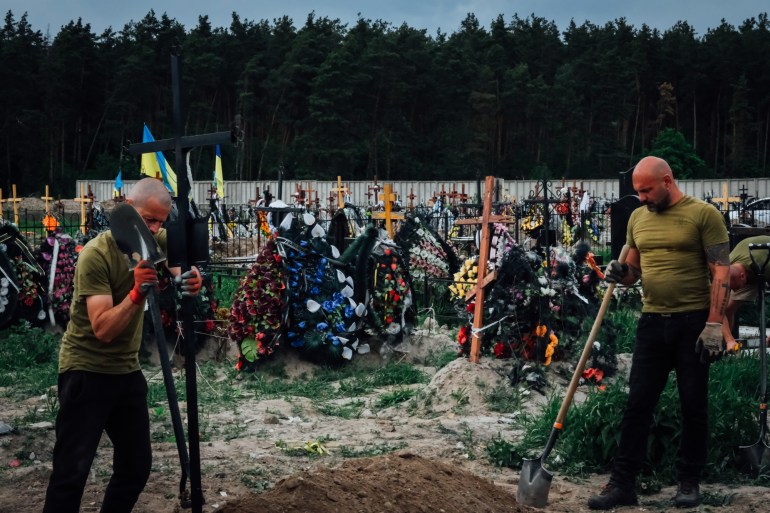
Russia claims to have destroyed command centre near Dnipro
Russia’s defence ministry says its forces destroyed a Ukrainian military control centre near the central city of Dnipro in a missile strike on Tuesday.
Alongside other regions of Ukraine, Dnipro and the surrounding Dnipropetrovsk region has seen an uptick in Russian shelling in recent days.
Kyiv made no immediate comment on the defence ministry’s claims. Al Jazeera could not independently verify the ministry’s claims.
Norway denies blocking Russian access to Arctic islands
Norway is not blocking Russian access to the Arctic archipelago of Svalbard, only applying international sanctions, the Nordic country’s foreign minister has told the Reuters news agency.
Anniken Huitfeldt’s remarks came after Russia on Wednesday accused Norway of disrupting the delivery of critical supplies and threatened retaliation against Oslo over access to Svalbard, citing unspecified “retaliatory measures” unless it resolved the issue.
Svalbard, midway between Norway’s north coast and the North Pole, is part of Norway, but Russia has the right to exploit the archipelago’s natural resources under a 1920 treaty, and some settlements there are populated mainly by Russians.
NATO member Norway, which is not in the European Union but applies EU sanctions against Russia, has said sanctions would not affect the transport of goods by sea to Svalbard.
Much of the freight for the archipelago’s Russian settlements, however, passes first by road through the border point between Russia and Norway on the mainland, which is closed to sanctioned goods.
Putin rejects Johnson’s claim a woman wouldn’t have invaded Ukraine
Russia’s president has rejected Johnson’s charge that if he were a woman he would not have invaded Ukraine.
Speaking at a news conference in the early hours of Thursday during a visit to Turkmenistan, Putin pointed to former British leader Margaret Thatcher’s decision to send troops into the Falklands as a rebuttal of the current UK prime minister’s theory.
Johnson on Wednesday dubbed Putin’s decision to launch what Moscow calls a “special military operation” against Ukraine a “perfect example of toxic masculinity” and mocked Putin’s macho posturing.
Hitting back, Putin told reporters: “It’s not an entirely accurate reference from the British Prime Minister to what is happening today.”
‘Significant action’ at NATO summit: AJE correspondent
Al Jazeera’s Bays, reporting from the NATO summit in Madrid, says there has been “significant action” at the meeting.
“The United States is going to set up a new headquarters in Poland and are bolstering their defences across the countries of the NATO alliance that are closest to Russia,” Bays said.
“And it looks pretty certain now … that there will be 32, not 30 NATO members with Sweden and Finland joining,” he added, citing the US-led alliance’s move to formally invite the two Nordic nations to become members.
Russia says its forces have withdrawn from Snake Island as a ‘gesture of goodwill’
Russian forces have withdrawn from Snake Island off Ukraine’s coast in the Black Sea as a “gesture of goodwill”, the country’s defence ministry says.
The ministry said the move showed Russia is not impeding United Nations efforts to organise a humanitarian corridor to export agricultural products out of Ukraine.
Ukraine and its Western allies have accused Russia of blockading Ukrainian ports to prevent the export of the country’s grain, contributing to a mounting global food crisis.
Snake Island, which Russia occupied on the first day of its invasion, achieved worldwide fame when Ukrainian border guards stationed there rejected a Russian warship’s demand for their surrender.
Sweden to bolster weapons support for Ukraine
Sweden’s defence ministry has said the country will send more anti-tank weapons and machine guns to Ukraine.
The arms package, which also includes equipment for mine clearing, is valued at around 500 million Swedish crowns ($49m), the ministry said.
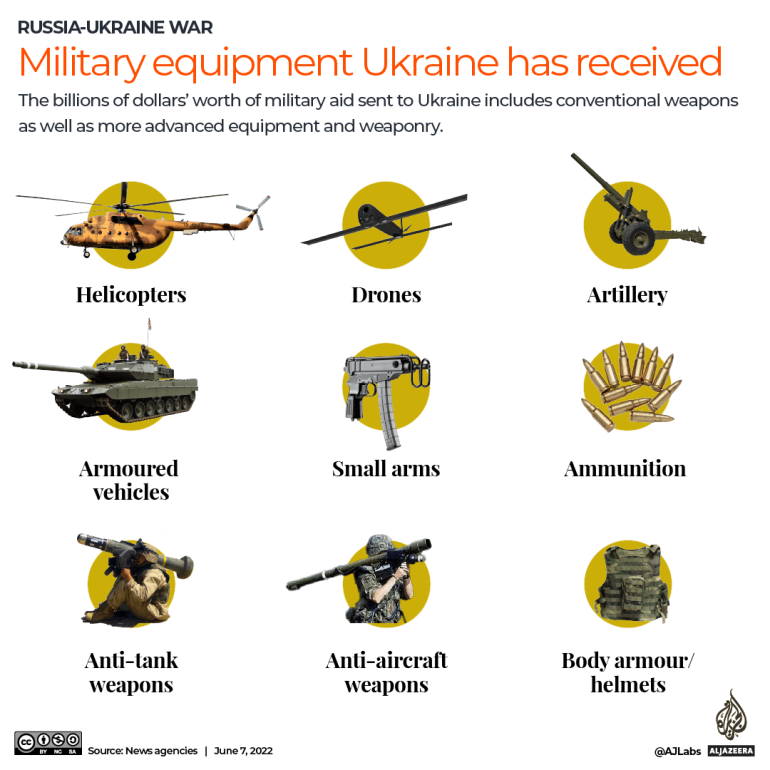
UK moves to counter Russian influence in Bosnia and Herzegovina
The United Kingdom has said it will deploy military specialists to Bosnia and Herzegovina to counter Russian influence and to “reinforce the NATO Mission and promote stability and security” in the country.
“We cannot allow the Western Balkans to become another playground for Putin’s pernicious pursuits. By fanning the flames of secessionism and sectarianism Russia seeks to reverse the gains of the last three decades in Bosnia and Herzegovina,” Prime Minister Boris Johnson said in a statement.
“That is why we are stepping up support to Bosnia and Herzegovina, answering the call from our friends to help protect the peace they so rightfully deserve to enjoy.”
European court tells Russia to ensure two Britons do not face death penalty
The European Court of Human Rights (ECHR) says it has issued an order to Russia to ensure that the death penalty is not carried out against two Britons who were captured while fighting for Ukraine.
Earlier this month, a court in the self-proclaimed Donetsk People’s Republic (DPR) in eastern Ukraine sentenced British citizens Aiden Aslin and Shaun Pinner to death, accusing them of “mercenary activities”.
The ECHR said it had issued an order for interim measures, telling Russia it “should ensure that the death penalty imposed on the applicants was not carried out; ensure appropriate conditions of their detention; and provide them with any necessary medical assistance and medication”.
The men’s families deny that the two, who were contracted to the Ukrainian armed forces, were mercenaries.
This month, the Russian parliament passed legislation to end the jurisdiction of Europe’s top human rights court in Russia, and two weeks ago a Kremlin spokesman, in reference to another ECHR ruling, said Moscow no longer implemented its decisions.
Germany says technical problem with gas pipeline a Russian pretext
A technical problem with the Nord Stream 1 gas pipeline reported by Russia is merely a pretext, German Economy Minister Robert Habeck has said.
“We are in a gas trade dispute with Putin and this won’t stop,” Habeck said at an event organised by Germany’s Sueddeutsche newspaper. “All agree, the technicians, Russian technicians, that Nord Stream 1 could now supply 100 percent gas. There is an excuse, a technical pretext that is taken,” he added.
The Nord Stream 1 pipeline, which supplies gas from Russia to Europe under the Baltic Sea, has seen reduced flows that could be suspended due what Moscow described as delays in technical repairs.

US disburses $1.3bn of promised aid to Ukraine
The US Treasury Department has announced the transfer of $1.3bn in economic aid to Ukraine as part of the initial $7.5bn promised to Kyiv by the White House in May.
“With this delivery of economic assistance, we reaffirm our resolute commitment to the people of Ukraine as they defend themselves against Putin’s war of aggression and work to sustain their economy,” Treasury Secretary Janet Yellen said in a statement.
Washington already disbursed two payments of $500m of that through the World Bank in April and May to help cover Ukraine’s immediate costs as it dealt with “Russia’s unprovoked and unjustified invasion,” the Treasury said.
Ship with 7,000 tonnes of grain leaves Ukraine port: Pro-Russia officials
A ship carrying 7,000 tonnes of grain has sailed from Ukraine’s port of Berdyansk, currently controlled by Russian forces, the region’s Moscow-appointed official said on Thursday.
“After numerous months of delay, the first merchant ship has left the Berdyansk commercial port, 7,000 tonnes of grain are heading toward friendly countries,” Evgeny Balitski, the head of the pro-Russia administration, said on Telegram.
Ukraine officials have accused Russia of stealing “several hundred thousand tonnes” of grain in Ukrainian areas under Russian occupation and selling it, while Russia has denied the claims.
Death toll in Mykolaiv climbs to six
Rescue workers have found another body in the rubble from an air attack in Mykolaiv on Wednesday, taking the death toll to six with another six wounded, emergency services say.
Earlier authorities said 10 missiles had fallen on the port city, with one hitting a multi-storey residential building.
Ukraine’s troops holding positions in Lysychansk: UK
Ukrainian forces continue to hold their positions in Lysychansk while ground combat is focused around the oil refinery, 10km southwest of the city centre, the UK’s defence ministry has said.
“Russian forces continue to pursue an approach of creeping envelopment from the Popasna direction, removing the need to force a major new crossing of the Siverskyi Donets River in this sector,” the ministry said in its latest intelligence briefing on Twitter.
“At the operational level, Russian forces continue to make limited progress as they attempt to encircle Ukrainian defenders in northern Donetsk Oblast via advances from Izium,” it added.
The ministry said that Ukraine’s ability to fight “delaying battles” and withdraw troops ” in good order before they are encircled,” as they did in Severodonetsk, “will continue to be a key factor in the outcome of the campaign”.
Latest Defence Intelligence update on the situation in Ukraine – 30 June 2022
Find out more about the UK government's response: https://t.co/e6OC5lhAxv
🇺🇦 #StandWithUkraine 🇺🇦 pic.twitter.com/RkEw9ka5F9
— Ministry of Defence 🇬🇧 (@DefenceHQ) June 30, 2022
Russia shelling Lysychansk relentlessly, storming the oil refinery: Governor
“Constant airstrikes” in Lysychansk destroyed the police department and damaged part of the oil refinery on Wednesday, the governor of Luhansk has said.
“It is difficult to find a safe place in the city. People dream of at least half an hour of silence, but the occupiers do not stop firing from all available weapons,” Serhiy Haidai wrote on Telegram.
The Russians on Thursday morning were conducting an offensive near Verkhnokamyanka and storming the Lysychansk refinery, he said without addressing Russia’s claims that it had taken control of the refinery.
Shelling was continuing along the territory of the Seversky Donets river, from both the Severodonetsk and Lysychansk side, Haidai said, adding that Russian forces were still attempting to block Lysychansk and take control of a section of the Lysychansk-Bakhmut highway.
Russian forces in control of Lysychansk oil refinery: Separatist leader
The Russian-installed ambassador to Moscow from the so-called Luhansk People’s Republic has said that Russian forces with local separatists have taken full control of the Lysychansk oil refinery, RIA news reports.
“The territory of the largest oil refinery in Ukraine … has completely come under the control of allied troops,” Rodion Miroshnik said.
Russia’s defence ministry said on Wednesday that its forces had defeated a battalion of Ukrainian troops near the Lysychansk oil refinery, according to RIA.
Al Jazeera could not independently verify these claims.
EU nears compromise deal to defuse standoff with Russia over Kaliningrad: Reuters
Trade through Lithuania to the Russian exclave of Kaliningrad could return to normal within days, two sources familiar with the matter have said, as European officials edge towards a compromise deal with the Baltic state to defuse a row with Moscow, Reuters reports.
Kaliningrad, which is bordered by EU states and relies on railways and roads through Lithuania for most goods, has been cut off from some freight transport from mainland Russia since June 17 under sanctions imposed by Brussels. But many in Europe fear an escalation after other restrictions pushed Russia to default on its debt.
European officials are in talks about exempting the territory from sanctions, which have hit industrial goods such as steel so far, paving the way for a deal in early July if EU member Lithuania drops its reservations, said the sources, who declined to be named because the discussions are private.
If the traditional route for Russian goods to Kaliningrad, first via its ally Belarus and then Lithuania, is not restored, the Baltic state fears Moscow could use military force to plough a land corridor through its territory, the person said.
Russian forces destroyed Dnipropetrovsk grain warehouse: Governor
Russian forces are continuing to attack communities in and around the Kryvyi Rih district of Dnipropetrovsk, the regional governor has said.
An attack destroyed a warehouse in the town of Zelenodolsk, containing 40 tonnes of grain, causing a fire, Valentyn Reznichenko wrote on Telegram.
Another hit the centre of the village Velyka Kostromka, he said, adding that there were so far no casualties.
Reznichenko said Russian forces fired from “different weapons” but didn’t specify which types.
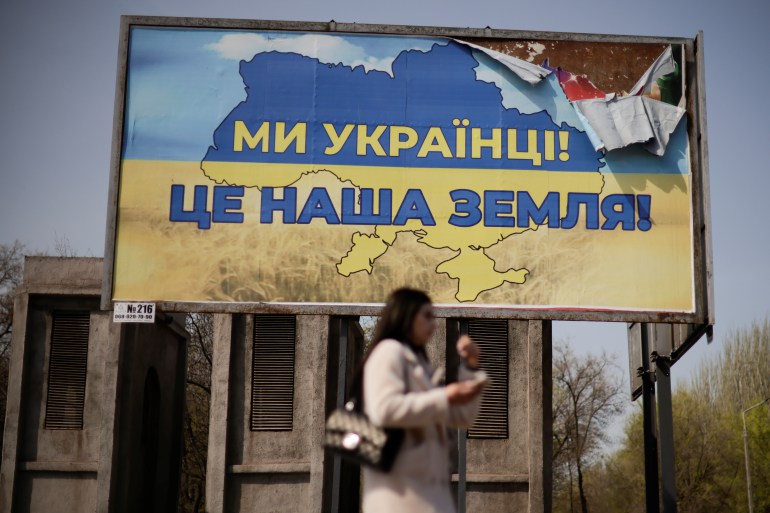
South Korea’s Yoon warns NATO of threat to ‘universal values’
South Korea’s president has warned NATO leaders of the threat to universal values at a time of new conflict and competition, a reference to Russia’s aggression in Ukraine and China’s engagement with Russia, a South Korean official told Reuters.
President Yoon Suk-yeol became the first South Korean leader to attend a NATO summit, joining national NATO leaders as an observer at a meeting in Spain as Russian forces intensified attacks in Ukraine.
“As a new structure of competitions and conflicts is taking shape, there is also a movement that denies the universal values that we have been protecting,” Yoon said in a speech on Wednesday, according to a South Korean official.
“He was referring to the Ukraine war, and as most other participating countries did, he raised concern about Russia’s responsibility for the war and China’s responsibility in the international community,” the official, who declined to be identified, said on Thursday. Yoon’s speech was not made public.
What Putin did in Ukraine is ‘evil’: UK’s Johnson
What Putin has done in Ukraine is “evil”, the UK’s prime minister has said.
Asked during an interview with GB News at the NATO summit in Madrid whether Putin was evil, Johnson said: “I think that what he has done is evil. And I think it probably follows that if you are what you do, then certainly.”
“It’s been an appalling act of unwarranted aggression against an innocent population,” he added.
Billionaire Branson visits Zelenskyy in Kyiv
British entrepreneur Richard Branson visited Zelenskyy in Ukraine’s capital on Wednesday.
“My main purpose in going to Kyiv was to meet and listen to Ukrainians, to understand their fears and concerns and also to learn what business, in partnership with civil society and governments, can do to support Ukraine most effectively,” Branson said in a statement on social media.
“We talked about maintaining global attention to the war in Ukraine, as well as prospects for cooperation in the postwar reconstruction of Ukraine”, Zelenskyy said in a statement on social media on Wednesday.
The Ukrainian presidency released video of the visit by Branson, the British billionaire and founder of Virgin Group. Branson also visited Hostomel Airport in the Kyiv region, and other sites of Russian attacks, he said, in a series of tweets following his visit.
After an invitation from @ZelenskyyUa, I travelled to Kyiv to meet with the President, Foreign Minister @DmytroKuleba and a group of Ukrainian business leaders. I also visited some of the sites of Russian attacks since Putin’s appalling invasion began https://t.co/f2Ccgf9BkS pic.twitter.com/W9RAFBAyyT
— Richard Branson (@richardbranson) June 29, 2022
New Zealand’s PM condemns Russia’s invasion of Ukraine
New Zealand’s prime minister has condemned Russia’s invasion of Ukraine, highlighted the importance of international rules and warned against a new arms race.
“We must stand firm on the rules-based order, call for diplomatic engagement and speak out against human rights abuses at all times when and where we see them,” Jacinda Ardern said in a speech at the NATO summit in Madrid.
She also said that China has become “more assertive and more willing to challenge international rules and norms”, and urged the use of diplomacy and economic links to build ties in the Indo-Pacific region.
New Zealand is not a member of NATO, but it is a partner of the Western defence alliance and on occasion New Zealand troops have supported NATO-led operations. In recent months it has contributed to the NATO Trust Fund for operations in Ukraine.
‘I didn’t fire a shot’, says American held by separatists in eastern Ukraine
A former US soldier captured in eastern Ukraine has said he did not fire a single shot while fighting for the Ukrainian side, in a plea for leniency from Russian-backed separatist authorities who will determine his fate.
In a video interview with Russia’s RIA state news agency released on Wednesday, Alexander Drueke said his fighting experience in Ukraine was limited to the day he was captured outside Kharkiv, Ukraine’s second-largest city.
“My combat experience here was that one mission on that one day,” said Drueke, looking haggard. “I didn’t fire a shot. I would hope that would play a factor in whatever sentence I do or don’t receive.”
Drueke, from Tuscaloosa, Alabama, was captured by the separatists with fellow American Andy Huynh, from Hartselle, Alabama. The Kremlin has said it cannot rule out that the two men would be sentenced to death if put on trial in a region held by Russian proxies who have held large swaths of territory since 2014.
NATO agrees to modernise Ukraine’s military
NATO has agreed to a long-term financial and military aid package to modernise Ukraine’s largely Soviet-era military.
The alliance’s new Strategic Concept document, its first since 2010, said that a “strong independent Ukraine is vital for the stability of the Euro-Atlantic area”.
To that end, “We stand in full solidarity with the government and the people of Ukraine in the heroic defence of their country,” the document said.
It also called Russia the “most significant and direct threat to the allies’ security”, having previously classified it as a “strategic partner”.
Rescuers attempting to evacuate residents from Lysychansk
Attempts to evacuate residents from the front-line eastern city of Lysychansk are continuing, Ukrainian authorities say.
About 15,000 people remain in the city, which is the focus of Russia’s attacks.
“Fighting is going on all the time. The Russians are constantly on the offensive. There is no let-up,” regional Governor Serhiy Haidai told Ukrainian television.
“Absolutely everything is being shelled,” he said.

Russia’s Duma moves forward on proposed law banning foreign media
The lower house of Russia’s parliament has approved the critical second reading of a proposed law that would allow the banning of foreign news media in response to other countries taking actions against Russian news outlets.
The proposal must still pass a third reading in the Duma and secure the upper house’s approval before going to the president to be signed into law. But the Duma’s approval on second reading, when a proposal still can undergo substantial changes, almost always prefigures a law’s enactment.
Russia has repeatedly complained in recent months that Western countries were improperly restricting Russian media by banning their operation or denying visas to their journalists. In early June, foreign ministry spokeswoman Maria Zakharova called in representatives of American media, including The Associated Press, to warn that they could be denied renewal of their visas and accreditation.
The draft law also calls for allowing Russia’s prosecutor general to cancel the registration of media outlets for disseminating “illegal, dangerous, unreliable publicly significant information or information expressing clear disrespect for society, the state, the Constitution of the Russian Federation, as well as aimed at discrediting the Russian armed forces,” state news agency RIA-Novosti reported.
Putin denies Russia’s responsibility for Kremenchuk strike
Russia’s President Putin has denied that Moscow’s forces were responsible for the missile attack on a crowded shopping centre in the Ukrainian town of Kremenchuk earlier this week, in which at least 18 people were killed and many remain missing in the rubble.
“Our army does not attack any civilian infrastructure sites. We have every capability of knowing what is situated where,” Putin told a news conference in the Turkmenistan capital of Ashgabat.
“I am convinced that this time, everything was done in this exact manner,” Putin said.
Ukraine accuses Russia of targeting the shopping centre and civilian shoppers. Western leaders have condemned the attack calling it “sickening” and “abominable”. On Wednesday, Pope Francis said the attack was “barbarous.”
NATO leaders give standing ovation for Kyiv orchestra during summit performance
The Kyiv Symphony Orchestra performed at Madrid’s Prado museum during a dinner hosted by Spanish Prime Minister Pedro Sanchez on Wednesday.
NATO leaders and officials stood and listened to the orchestra, then gave them a standing ovation.
Some orchestra members paid homage to their homeland by wearing emblems featuring Ukraine’s national colours – blue and yellow – and donning Ukrainian flags on their instruments.
Twin Russian raids ‘deliberately targeted’ Mariupol theatre: Amnesty
Evidence suggests twin Russian air raids deliberately targeted a theatre being used as a shelter in the city of Mariupol, rights group Amnesty International has said in a report.
The report condemned the attack as a war crime. Amnesty said there was no evidence that the Donetsk Academic Regional Drama Theatre was a base of operations for Ukrainian soldiers and every indication that it was a haven for civilians seeking protection from weeks of relentless shellings and air raids. Using satellite imagery from that morning, Amnesty determined the sky was consistently clear enough for any pilot to see the word “CHILDREN” written in giant Cyrillic letters in the building’s front and back.
The March 16 strikes devastated the building. City officials initially estimated around 300 dead. An Associated Press investigation found the attack may have killed closer to 600 people inside and outside the building. Most of the two dozen survivors and witnesses AP interviewed put the number even higher. Researchers for Amnesty International identified 12 of the dead.
Those who bore witness “saw bodies, remains of bodies. And that’s how we can try to reconstruct. But the truth is that we will never know the truth. We will never get the final figure. And what is more or horrifying for me is that we will never know the whole names,” said Oksana Pokalchuk, Amnesty’s director general for Ukraine.
Ukrainian troops train in UK to use advanced rocket systems
Hundreds of Ukrainian troops have completed military training in the UK, including on the Multiple Launch Rocket Systems (MLRS) the UK government is supplying to help counter Russian artillery tactics.
Ukrainian troops were filmed earlier this week loading and firing 105mm light guns during exercises in Salisbury, England – one part of a British-led programme that has been undertaken by more than 450 Ukrainian armed forces with support from New Zealand. MLRS systems were also shown in use.
“It’s a force multiplier,” Captain James Oliphant of the Royal Artillery, who was involved in the three-week MLRS training element, told reporters.
“Because it’s a tracked vehicle – their rockets systems are wheeled – it is going to give them more manoeuvrability which is going to going to aid in their survivability.”
Five killed in Mykolaiv raids Wednesday: Zelenskyy
Russia continued to shell cities and settlements across Ukraine Wednesday, stepping up its attacks beyond the Donbas region.
Zelenskyy said Russian forces struck the town of Ochakiv in the Dnipropetrovsk region, the port city of Mykolaiv, and across the Kharkiv and Sumy regions.
He said 10 missiles fell on Mykolaiv on Wednesday, “all of them were aimed at civilian targets”.
“One of these missiles, a hypersonic anti-ship missile ‘Onyx’, destroyed an ordinary five-story building. Dismantling of the debris continued over the day. As of now, five people are known to have been killed,” Zelenskyy said.
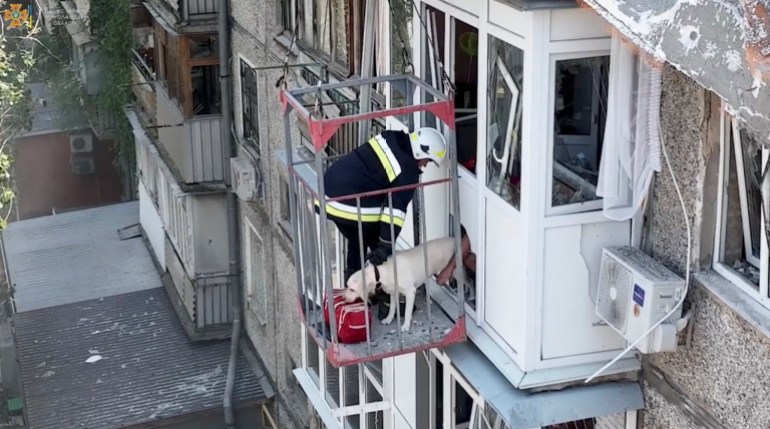
UK to provide another 1bn pounds ($1.2bn) of military support to Ukraine
The UK will provide another one billion pounds ($1.2bn) of military support to Ukraine, its government has said, as NATO branded Russia the biggest “direct threat” to Western security.
The funding will go towards boosting Ukraine’s defence capabilities, including air defence systems, uncrewed aerial vehicles, new electronic warfare equipment and thousands of pieces of equipment for Ukrainian soldiers.
“UK weapons, equipment and training are transforming Ukraine’s defences against this onslaught. And we will continue to stand squarely behind the Ukrainian people to ensure Putin fails in Ukraine,” PM Johnson said in a statement.
The latest funding comes after the UK said in May it would provide an additional 1.3 billion pounds ($1.58bn) in military support and aid to Ukraine, and takes the UK’s total military and economic support to 3.8 billion pounds ($4.61bn) this year.
NATO vastly expands troops at high readiness for long-term Russian threat
NATO has agreed to put more than 300,000 troops at high readiness from 2023, up from 40,000 presently. The new military lineup is designed to better counter Russia, the country the alliance has designated as posing the greatest threat.
The move replaces the NATO Response Force, which was for years the first to respond to any Russian attack or other crisis. The new model resembles the way NATO forces were organised during the Cold War. At that time, specific allied countries were assigned the defence of specific sectors of the border between Western and Eastern Germany.
“Today, NATO leaders decided a fundamental shift in our defence and deterrence to respond to a new security reality,” NATO Secretary General Jens Stoltenberg told reporters, adding NATO would enhance its “battlegroups in the eastern part of the alliance up to brigade level.”
A brigade has some 3,000 to 5,000 troops, while a battalion – the unit that made up a battlegroup in the past – normally has between 300 to 1,000 troops.
Biden thanks Erdogan for NATO deal on Finland, Sweden
The US president has thanked his Turkish counterpart Recep Tayyip Erdogan for striking a deal with Finland and Sweden that has paved the way for the two Nordic countries to soon become NATO candidates.
Biden, in brief remarks before their meeting on the sidelines of the NATO summit in Madrid, also thanked Erdogan for Ankara’s efforts to help get grain out of Ukraine. Erdogan said he hoped diplomacy would help solve the issues around Ukraine’s grain exports.
Canada to lead efforts to form ‘combat capable’ brigade in Latvia: Minister
Canada has signed an agreement to work with Latvia and NATO partners to lead efforts to form a “combat capable” brigade in Latvia, Canadian Defence Minister Anita Anand has said.
“This is a commitment that the Canadian government is making together with Latvia to work with our allies to move towards and surge to a brigade level force in Latvia,” Anand told reporters, adding that details about an exact number of troops had not yet been determined.
“We will commit additional troops with our allies going forward, but we need to have the conversation about how many additional troops will be committed by each of the 10 member nations of the Enhanced Forward Presence battle group,” Anand said.
Indonesian President offers to ‘deliver message’ to Putin from Ukraine
Indonesian President Joko Widodo has offered to “deliver a message” from Ukrainian President Volodymyr Zelenskyy to Putin to try to boost peace hopes.
“Even though it’s very hard to achieve, I expressed the importance of a peaceful resolution. I offer to deliver a message from President Zelenskyy to President Putin that I’ll meet soon,” Widodo – known as Jokowi – said.
He also confirmed Indonesia’s contribution to medical and infrastructure aid to Kyiv.
Jokowi arrived in Kyiv from Poland by train on Wednesday morning. He also visited the town of Irpin, where Ukraine suspects Russian soldiers committed atrocities. Moscow denies the allegations.
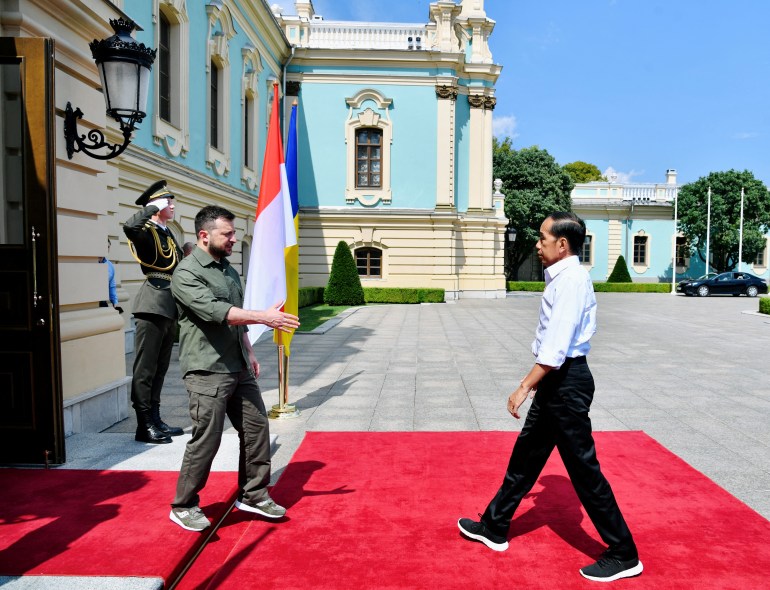
IAEA loses transmission from Ukraine’s Russian-held nuclear power plant
The United Nations atomic watchdog has said it has again lost its connection to its surveillance systems keeping track of nuclear material at the Russian-held Zaporizhzhia nuclear power plant in Ukraine, Europe’s largest, which the watchdog wants to inspect.
“The fact that our remote safeguards data transmission is down again – for the second time in the past month – only adds to the urgency to dispatch this mission (to Zaporizhzhia),” the International Atomic Energy Agency said in a statement on Wednesday. The connection was lost on Saturday “due to a disruption of the facility’s communication systems”, it added.
Read all the updates from June 29 here.